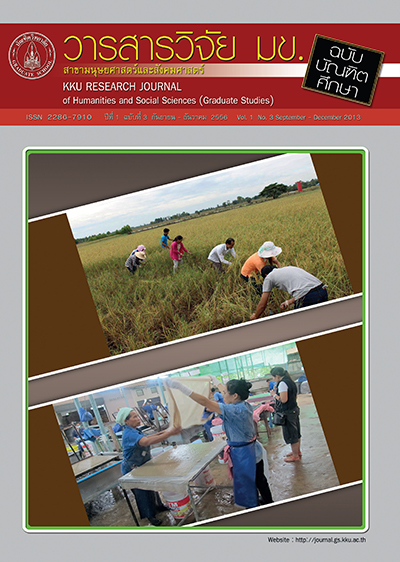การจัดกลุ่มผู้ส่งมอบด้วย Cluster Analysis เพื่อพัฒนาผู้ส่งมอบในธุรกิจค้าปลีก(Supplier Cluster Analysis for Supplier Development in Retail Business)
Keywords:
Supplier development(การพัฒนาผู้ส่งมอบ), Cluster analysis(การจัดกลุ่ม)Abstract
การขยายตัวของธุรกิจค้าปลีกในปัจจุบันส่งผลให้เกิดการแข่งขันอย่างรุนแรง โดยเฉพาะในเรื่อง ของการสร้างความพึงพอใจให้กับลูกค้า หนึ่งในการสร้างพึงพอใจที่สำคัญ คือ การมีสินค้าเพียงพอและ พร้อมจำหน่ายแก่ลูกค้า ซึ่งในปัจจุบันมีการขาดสินค้าโดยมีสาเหตุส่วนหนึ่งมาจากผู้ส่งมอบ บทความนี้ มีวัตถุประสงค์เพื่อศึกษาถึงการจำแนกผู้ส่งมอบออกเป็นกลุ่มตามระดับของคุณสมบัติที่มีอยู่ในปัจจุบัน และศึกษาปัญหาในการส่งสินค้าของผู้ส่งมอบในธุรกิจค้าปลีก ของบริษัทกรณีศึกษาซึ่งเป็นธุรกิจค้าปลีก ข้ามชาติชาติในรูปแบบ Discount store เพื่อกำหนดแนวทางในการพัฒนาผู้ส่งมอบ ในการศึกษานี้ผู้วิจัย ได้ศึกษาข้อมูลเกี่ยวกับคุณสมบัติ ข้อกำหนด อุปสรรคและประโยชน์ที่คาดว่าจะได้รับจากการพัฒนาผู้ส่งมอบ ในผู้ส่งมอบประเภทสินค้าอุปโภคบริโภค จากนั้นจึงนำข้อมูลมาจัดกลุ่มด้วยเครื่องมือ K-Mean Cluster Analysis เพื่อจัดกลุ่มของผู้ส่งมอบที่มีระดับของคุณสมบัติใกล้เคียงกันไว้ด้วยกัน พบว่าจำนวนกลุ่มของ ผู้ส่งมอบที่เหมาะสมคือ 2 กลุ่ม ซึ่งกลุ่มที่ 1 นั้นจะมีระดับของคุณสมบัติที่ต่ำกว่ากลุ่มที่ 2 ทุกประการ จาก นั้นจึงกำหนดแนวทางในพัฒนาผู้ส่งมอบให้เหมาะสมตามปัญหาและความต้องการของทั้งสองฝ่าย ซึ่งพบว่า ปัญหาสำคัญที่ควรมีการพัฒนาคือการแบ่งปันข้อมูลซึ่งกันและกัน ซึ่งจะนำไปสู่การพัฒนาความสัมพันธ์ เพื่อความร่วมมือในระยะยาว เช่น การนำระบบการบริหารสินค้าคงคลังด้วยผู้ส่งมอบ (Vendor Managed Inventory : VMI) มาประยุกต์ใช้เพื่อเพิ่มระดับของสินค้าเพื่อจำหน่ายแก่ลูกค้าและลดปัญหาทางด้าน ข้อมูลการสั่งซื้อที่ไม่แน่นอน
The growing of retail business has been very competitive so customer satisfaction is a key success factor. Products availability can satisfy customers because they can fulfill their shopping list once they left the store. However, one cause of low products availability comes from suppliers’ performance. This research aims to classify suppliers according to their characteristics and study about issues of product delivery in retail supply chain. The study deploys case method using one multinational retailer who operates discount store worldwide as a case study company to identify supplier development plan. The suppliers’ characteristic, criteria, obstacles and benefits from supplier development are analyzed. After the analysis, K-Mean cluster analysis will be used to classify suppliers in order to putting similar characteristics together. The result found out that there are two capable groups of supplier which group 1 has better qualification than group 2 for all dimensions. After that, the supplier development is developed to match with requirements for both retailer and its suppliers. The key issue is information sharing which is the foundation for relationship development. One tool, Vendor Managed Inventory (VMI), will be used to increase products availability and solve the issue of purchasing information inaccuracy.




